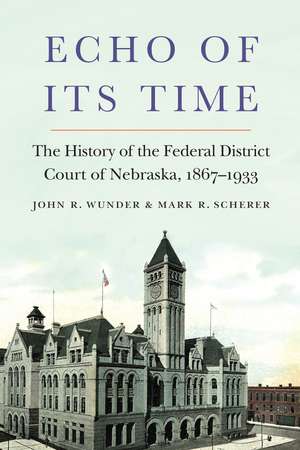Echo of Its Time: The History of the Federal District Court of Nebraska, 1867-1933
Autor John R. Wunder, Mark R. Schereren Limba Engleză Hardback – 31 ian 2019
Throughout its existence the Federal District Court of Nebraska has echoed the dynamics of its time, reflecting the concerns, interests, and passions of the people who have made this state their home. Echo of Its Time explores the court’s development, from its inception in 1867 through 1933, tracing the careers of its first four judges: Elmer Dundy, William Munger, Thomas Munger (no relation), and Joseph Woodrough, whose rulings addressed an array of issues and controversies echoing macro-level developments within the state, nation, and world. Echo of Its Time both informs and entertains while using the court’s operations as a unique and accessible prism through which to explore broader themes in the history of the state and the nation.
The book explores the inner workings of the court through Thomas Munger’s personal correspondence, as well as the court’s origins and growing influence under the direction of its legendary first judge, Elmer Dundy. Dundy handled many notable and controversial matters and made significant decisions in the field of Native American law, including Standing Bear v. Crook and Elk v. Wilkins. From the turn of the century through 1933 the court’s docket reflected the dramatic and rapid changes in state, regional, and national dynamics, including labor disputes and violence, political corruption and Progressive Era reform efforts, conflicts between cattle ranchers and homesteaders, wartime sedition and “slacker” prosecutions, criminal enterprises, and the endless battles between government agents and bootleggers during Prohibition.
The book explores the inner workings of the court through Thomas Munger’s personal correspondence, as well as the court’s origins and growing influence under the direction of its legendary first judge, Elmer Dundy. Dundy handled many notable and controversial matters and made significant decisions in the field of Native American law, including Standing Bear v. Crook and Elk v. Wilkins. From the turn of the century through 1933 the court’s docket reflected the dramatic and rapid changes in state, regional, and national dynamics, including labor disputes and violence, political corruption and Progressive Era reform efforts, conflicts between cattle ranchers and homesteaders, wartime sedition and “slacker” prosecutions, criminal enterprises, and the endless battles between government agents and bootleggers during Prohibition.
Preț: 332.94 lei
Nou
Puncte Express: 499
Preț estimativ în valută:
63.71€ • 66.14$ • 53.13£
63.71€ • 66.14$ • 53.13£
Carte disponibilă
Livrare economică 03-17 martie
Preluare comenzi: 021 569.72.76
Specificații
ISBN-13: 9781496212146
ISBN-10: 1496212142
Pagini: 376
Ilustrații: 19 illustrations, index
Dimensiuni: 152 x 229 x 36 mm
Greutate: 0.68 kg
Editura: Nebraska
Colecția University of Nebraska Press
Locul publicării:United States
ISBN-10: 1496212142
Pagini: 376
Ilustrații: 19 illustrations, index
Dimensiuni: 152 x 229 x 36 mm
Greutate: 0.68 kg
Editura: Nebraska
Colecția University of Nebraska Press
Locul publicării:United States
Notă biografică
John R. Wunder is a professor emeritus of history at the University of Nebraska–Lincoln. He is the author or editor of numerous books, including The Nebraska-Kansas Act of 1854 (Nebraska, 2008) and Native American Sovereignty. Mark R. Scherer is a professor of history at the University of Nebraska Omaha. He is the author of Rights in the Balance: Free Press, Fair Trial, and Nebraska Press Association v. Stuart and Imperfect Victories: The Legal Tenacity of the Omaha Tribe, 1945–1995 (Nebraska, 1999).
Cuprins
Contents
List of Illustrations
Introduction
1. In the Beginning
2. The Dundy Years
3. Native Americans and Judge Dundy
4. Railroads and the Ermine of the Bench
5. The Politics of Transition
6. The “One Munger” Court
7. The Cattle Barons Cases
8. The “Two Munger” Court
9. The Early Munger-Woodrough Years
10. Prohibition and the Dennison Trial
Notes
Bibliography
Index
List of Illustrations
Introduction
1. In the Beginning
2. The Dundy Years
3. Native Americans and Judge Dundy
4. Railroads and the Ermine of the Bench
5. The Politics of Transition
6. The “One Munger” Court
7. The Cattle Barons Cases
8. The “Two Munger” Court
9. The Early Munger-Woodrough Years
10. Prohibition and the Dennison Trial
Notes
Bibliography
Index
Recenzii
"One test of a good history book is whether it increases one's desire to read further on the subjects it covers. Echo of Its Time is a book that makes me want to read more."—Troy Johnson, Annals of Wyoming
"This well-researched and written study should appeal to lawyers; those interested in the advance of justice in our state; those wishing to know the influence of various economic or political forces from early railroad days to the end of Prohibition; historians in general; and anyone with an interest in the struggle of our federal courts to balance the national economic and political interests with the interests of the common man, whether small farmers, laborers, or Native Americans."—John A. Gale, Nebraska History
"[A] well-written new book."—Omaha World-Herald
“Echo of Its Time makes an important contribution to the sometimes clouded working of the federal courts. Because much Great Plains legal history has focused on the nineteenth century, this book is especially welcome, delving as it does into the often neglected twentieth century. I have taught Nebraska history for almost twenty years but I still learned a great deal about the state’s federal judges and the types of cases that ended up in federal court.”—Mark R. Ellis, professor of history at the University of Nebraska Kearney and author of Law and Order in Buffalo Bill’s Country: Legal Culture and Community on the Great Plains, 1867–1910
“Echo of Its Time is an excellent title for a book which shows how the judges of the Federal District Court of Nebraska addressed major issues as the Great Plains frontier jurisdiction evolved into an early twentieth-century rural-urban Midwestern society. . . . Wunder and Scherer have done an excellent job in showing us how our courts, their judges, and other officers are at the heart of the American experience.”—Harl Dalstrom, professor of history emeritus at the University of Nebraska Omaha
